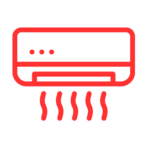How Humidity Affects Your AC: Tips for Control and Repair
Humidity plays a crucial role in the performance and efficiency of your air conditioning system. While air conditioners are designed to cool your home, they also help manage humidity levels. Excessive moisture can affect not just your comfort but also the functionality and lifespan of your AC unit. Here’s how humidity impacts your air conditioner and what you can do to maintain optimal performance.

1. Reduced Efficiency:

High humidity levels force your air conditioner to work harder to remove excess moisture from the air. This added strain can reduce the efficiency of your system, leading to increased energy bills and wear on the unit.
2. Increased Load:

When humidity levels are high, the air feels warmer, which means your AC has to work harder to achieve the desired temperature. This increased cooling load can lead to more frequent cycling and potential overworking of the system.
3. Mold Growth:

Excess moisture can lead to mold and mildew growth in your home, particularly in areas with poor ventilation. Mold can affect both your health and your air conditioner’s performance, as it can build up in the ducts and filters, reducing airflow and efficiency.
4. Condensation Issues:

High humidity can cause excessive condensation on your AC’s evaporator coils, leading to water damage and potential leaks. Over time, this can result in more significant issues such as rust and corrosion.
Tips for Managing Humidity and Maintaining Your AC
1. Use Dehumidifier:

A dehumidifier can help control indoor humidity levels, reducing the burden on your air conditioner. Consider using a dehumidifier in conjunction with your AC to maintain optimal humidity and comfort levels.
2. Regular Maintenance:

Schedule regular maintenance for your air conditioner to ensure it’s running efficiently. This includes cleaning or replacing filters, checking refrigerant levels, and inspecting the evaporator and condenser coils.
3. Check Home:

Inspect your home for any leaks or areas where moisture might be entering. Sealing leaks and ensuring proper insulation can help manage humidity levels and protect your AC system.
4. Optimize Ventilation:

Proper ventilation is essential for controlling humidity. Use exhaust fans in areas prone to high moisture, such as bathrooms and kitchens, and ensure your home’s ventilation system is functioning properly.
5. Install Humidistat:

A humidistat can help monitor and control indoor humidity levels. It works in conjunction with your air conditioner to maintain a comfortable and consistent humidity level, reducing the strain on your system.
6. Clean Drain Line:

The condensate drain helps remove excess moisture from the air. Ensure it’s clean and free of obstructions to prevent water buildup and potential damage to your AC system.
Don't Wait, Act Now
Stop those restless night sweats that are infamous with Floridas humidity! For a proactive solution to humidity issues and to upgrade your AC system, contact All Star Heating & Cooling today. Let us help you lock out humidity and keep your home cool and comfortable all year round!

